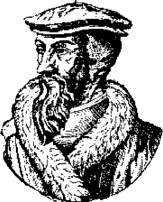John Calvin
Calvin was a French theologian who joined the Reformation in 1533 and became its most influential leader. He established a theocratic state, in Geneva, which became the centre of a highly organized missionary movement, spreading Calvinism far afield by the mid 16th century*.
Calvin prepared for a career in the Church, then underwent a "sudden conversion" similar to Luther's. In Geneva (where the Zwinglian movement had won strong support), Calvin put into practice the theology worked out systematically in his treatise "Institutes of the Christian Religion," the most influential treatise of the Protestant Reformation.
Huldrich Zwingli and the Anabaptists*.
The principles of Calvinism
Calvin accepted the basic tenets of Lutheranism but placed greater emphasis upon the evil nature of humans and the predestination of the soul*.
He went further than Luther or Zwingli in banishing the doctrines and practices of Catholicism; as well as eliminating religious ornaments and images he replaced the old hierarchical structure of government with assemblies of elected ministers and "elders." Geneva became a theocratic state, strictly enforcing moral standards on all its citizens* lest the self-indulgence of individuals infect the whole of society. An impressed John Knox (whose spelling reveals his Scottish accent) described it as "the maist perfyt schoole of Chryst that ever was in the erth since the dayis of the Apostillis."
Works by Calvin are available on line.
Footnotes
-
Calvinism spreads
By 1560, Calvinist synods were being held covertly in France (by the Huguenots) and John Knox had founded the Presbyterian Church of Scotland; loosely organized synods began to be held in England in the 1570s.
-
No need for morality?
Calvin actually believed in double predestination--that all souls are predestined either for salvation or damnation. Grace, or damnation, is therefore irresistible. Although such a view might seem to free us from moral responsibility, Calvin held that God's grace is evident in those who live a pious and moral life; and a truly godly Christian must be an active instrument to spread God's glory.
-
Calvin is watching you. . .
A disciplinary council (the Consistory) appointed committees of godly Christians to make surprise house calls on the people of Geneva to check up on their behaviour. It also collected the reports of informants. Devil-inspired luxuries such as theatre-going, dancing, and card-playing were strictly forbidden, and innkeepers had to ensure their customers said grace before drinking or eating. Capital crimes included adultery, witchcraft, blasphemy, and heresy. There were 58 executions in the first four years of Calvin's "rule."
